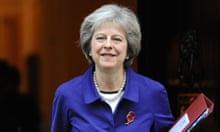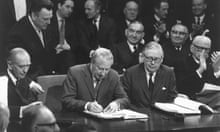Theresa May has accepted the need to have “full and transparent” parliamentary scrutiny before triggering Brexit, as Labour demanded answers to 170 questions about leaving the EU.
In a last-minute concession, the government accepted a Labour motion calling for MPs to have more say over the strategy for leaving the EU before article 50 is triggered by the end of March.
May had been facing her first government defeat over the motion on Wednesday, as a number of Conservatives indicated they were prepared to vote with Labour to demand greater public debate over the Brexit negotiating strategy.
The concession does not go as far as specifying that MPs should get a formal vote on article 50 or any Brexit deal and slightly amends Labour’s version to say the government’s negotiating position must not be undermined.
However, it does mean there will have to be a substantive parliamentary debate on No 10’s strategy at a later date before the UK embarks on Brexit. One Tory MP said this meant the Commons would have to broadly approve the negotiating position before article 50 is invoked.
Emily Thornberry, the shadow foreign secretary, said it was a significant U-turn and Labour would force the government to be accountable over Brexit.
She told BBC Radio 4’s Today programme that the opposition would not let ministers “go into a locked room and come out with some plan that they want to keep secret”.
Thornberry and Keir Starmer, the shadow Brexit secretary, are demanding answers to at least 170 questions about leaving the EU on everything from single market membership to the impact on the NHS.
However, May and her ministers are refusing to disclose the details of what they want from talks with Brussels, saying they will not provide a running commentary on their negotiating plans. The prime minister is also declining to give parliament a formal vote on the decision to trigger the Brexit process or any deal she achieves, saying it is the government’s prerogative.
Thornberry said this secrecy was “nonsense”, as many of the negotiating demands would emerge as soon as the UK started talks with other EU member states.
May has remained silent on the form of Brexit she wants to pursue but there are already tensions between ministers about whether to go for a “hard” deal securing a clean break with the EU.
The alternative is a deal maintaining as much access to the single market as possible while potentially still paying into the Brussels budget and accepting a high degree of free movement.
It was reported that David Davis, the Brexit secretary, was frustrated by a leak from the Treasury suggesting a hard Brexit could cost the UK £66bn.
The former Labour leader Ed Miliband, who is urging May to let parliament scrutinise the Brexit negotiations, says Labour should ready itself to capitalise on the mandate for change represented by the referendum result.
“Personally, I think Brexit is really important, and it’s got to become an opportunity for us,” he told an event in London to relaunch the New Economics Foundation (Nef) thinktank on Tuesday. “We’ve got to talk about the deeper forces at work with Brexit, but also why were those forces mobilised in part in a way that I didn’t manage, and Labour hasn’t managed?”
He said the Brexit vote was a signal that voters wanted to see a radical change in the way Britain was run – including electoral reform – and Jeremy Corbyn’s Labour party should be ready to respond.
“There was no sense that this was a small decision; this was a big decision and a big sense of change,” he said. “Labour has an absolutely huge opportunity in my view, at the moment, and I don’t think we should be blind to that at all.”
Nef is now being run by Marc Stears, a former Miliband adviser, and aims to produce practical proposals that would amount to a leftwing reading of the vote-winning Brexit campaign slogan “take back control”.
But Miliband’s fellow panellist Vince Cable, the former Liberal Democrat business secretary, said the referendum result was in fact a sign that the electorate had shifted to the right.
May used her party conference speech last week to suggest she would use the vote as a mandate for tougher immigration controls and a more interventionist government.









Comments (…)
Sign in or create your Guardian account to join the discussion